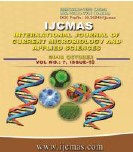


 National Academy of Agricultural Sciences (NAAS)
National Academy of Agricultural Sciences (NAAS)

|
PRINT ISSN : 2319-7692
Online ISSN : 2319-7706 Issues : 12 per year Publisher : Excellent Publishers Email : editorijcmas@gmail.com / submit@ijcmas.com Editor-in-chief: Dr.M.Prakash Index Copernicus ICV 2018: 95.39 NAAS RATING 2020: 5.38 |
The beneficial effects of consuming probiotics wouldn’t have been possible without the extensive research for the past two decades. However, due to enhanced awareness and health consciousness among today’s population, there is an emerging trend of counterparts and substitutes for dairy probiotics. Globally, the commercial market of dairy probiotics is on boom, however, the allergic reactions associated with the dairy ingredients and lactose intolerance in people has resulted in the extensive research and development of non-dairy probiotics, which prove to be beneficial for health conscious and allergy vulnerable population. Non-dairy probiotics have geared up in the market due to their wide acceptability regarding taste, consumption benefits and cost effectiveness, besides the satisfactory nature of the non-dairy probiotic strains has been an important factor for their sustainability and growth. Even though dairy probiotics have world over market, the emerging trend of the non-dairy probiotics has lead to enhanced acceptability regarding the beneficial health implications.
 |
 |
 |
 |
 |